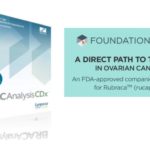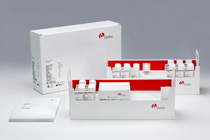Recently FDA Approved Companion Diagnostics

Abbott Real Time IDH2 and Idhifa® (enasidenib)
Abbott RealTime IDH2 is an in vitropolymerase chain reaction (PCR) assay for the qualitative detection of single nucleotide variants (SNVs) coding nine IDH2 mutations (R140Q, R140L, R140G, R140W, R172K, R172M, R172G, R172S, and R172W) in DNA extracted from human blood (EDTA) or bone marrow (EDTA).
Abbott RealTime IDH2 is for use with the Abbott m2000rt System.
Abbott RealTime IDH2 is indicated as an aid in identifying acute myeloid leukemia (AML) patients with an isocitrate dehydrogenase-2 (IDH2) mutation for treatment with IDHIFA® (enasidenib).
IDHIFA® is a trademark of Celgene.

Praxis Extended RAS Panel and Vectibix*
To evaluate mutations known to affect the efficacy of Vectibix* for treatment of metastatic colorectal cancer, Illumina offers the Extended RAS Panel. This Food and Drug Administration (FDA)-approved next-generation sequencing (NGS) kit assesses 12 codons in KRAS/NRAS to simultaneously determine the presence of 56 activating mutations.
The Extended RAS Panel is used to aid in the identification of patients eligible for treatment with Vectibix. The panel is intended to be used on the MiSeqDx instrument. On-instrument Local Run Manager software helps create a sequencing run, monitor run status, and analyze the sequencing data. It then delivers an easy-to-interpret report to guide therapy decisions accurately and efficiently.
*Vectibix is a registered trademark of Amgen, Inc.

Oncomine Dx Target Test for NSCLC
ThermoFisher Scientific's Oncomine Dx Target Test is a qualitative in vitro diagnostic test that uses targeted high-throughput, parallel-sequencing technology to detect sequence variations in 23 genes in DNA and RNA isolated from formalin-fixed, paraffin-embedded tumor (FFPE) tissue samples from patients with non-small cell lung cancer (NSCLC) using the Ion PGM Dx System.
Sequence variations in NSCLC DNA for the following 23 genes have been reported: AKT1, ALK, BRAF, CDK4, DDR2, EGFR, ERBB2, ERBB3, FGFR2, FGFR3, HRAS, KIT, KRAS, MAP2K1, MAP2K2, MET, MTOR, NRAS, PDGFRA, PIK3CA, RAF1, RET, and ROS1. Sequence variation in NSCLC RNA for the ROS1 gene has also been reported.
The Oncomine Dx Target Test is also indicated as a companion diagnostic to identify:
• ROS1 fusion–positive NSCLC patients for treatment with XALKORI® (crizotinib)
• BRAF V600E–positive NSCLC patients for treatment with Tafinlar+Mekinist® (dabrafenib in combination with trametinib)

LeukoStrat® CDx FLT3 Mutation Assay (InvivoScribe)
The LeukoStrat® CDx FLT3 Mutation Assay is a PCR-based, in vitro diagnostic test designed to detect internal tandem duplication (ITD) mutations and the tyrosine kinase domain mutations D835 and I836 in the FLT3 gene in genomic DNA extracted from mononuclear cells obtained from peripheral blood or bone marrow aspirates of patients diagnosed with acute myelogenous leukemia (AML). The LeukoStrat® CDx FLT3 Mutation Assay is used as an aid in the selection of patients with AML for whom RYDAPT (midostaurin) treatment is being considered.

FoundationFocus CDxBRCA Assay and Rubraca™
The FoundationFocus™ CDxBRCA is a next generation sequencing based in vitrodiagnostic device for qualitative detection of BRCA1 and BRCA2 alterations in formalin-fixed paraffin-embedded (FFPE) ovarian tumor tissue. The FoundationFocus CDxBRCA assay detects sequence alterations in BRCA1 and BRCA2 (BRCA1/2) genes. Results of the assay are used as an aid in identifying ovarian cancer patients for whom treatment with Rubraca™ (rucaparib) is being considered. If a patient is positive for any of the deleterious alterations specified in the BRCA1/2 classification, the patient may be eligible for treatment with Rubraca. This assay is to be performed at Foundation Medicine, Inc., a single laboratory site located at 150 Second Street, Cambridge, MA 02141.

PD-L1 IHC 22C3 PharmDx and Pembrolizumab
Dako North America's PD-L1 IHC 22C3 pharmDx is a qualitative immunohistochemical assay using Monoclonal Mouse Anti-PD-L1, Clone 22C3 intended for use in the detection of PD-L1 protein in formalin-fixed, paraffin-embedded (FFPE) non-small cell lung cancer (NSCLC) tissue using EnVision FLEX visualization system on Autostainer Link 48. PD-L1 protein expression is determined by using Tumor Proportion Score (TPS), which is the percentage of viable tumor cells showing partial or complete membrane staining at any intensity. The specimen should be considered to have PD-L1 expression if TPS ≥ 1% and high PD-L1 expression if TPS ≥ 50%.
PD-L1 IHC 22C3 pharmDx is indicated as an aid in identifying NSCLC patients for treatment with KEYTRUDA® (pembrolizumab). See the KEYTRUDA® product label for expression cutoff values guiding therapy in specific clinical circumstances.

cobas® EGFR Mutation Test v2 for Tarceva® (erlotinib) and TAGRISSO™ (osimertinib) and
The Roche Cobas® EGFR Mutation Test v2 is a real-time PCR test for the qualitative detection of defined mutations of the epidermal growth factor receptor (EGFR) gene in non-small cell lung cancer (NSCLC) patients. Defined EGFR mutations are detected using DNA isolated from formalin-fixed paraffin-embedded tumor tissue (FFPET) or circulating-free tumor DNA (cfDNA) from plasma derived from EDTA anti-coagulated peripheral whole blood.
The test is indicated as a companion diagnostic to aid in selecting NSCLC patients for treatment with the targeted therapies listed below in accordance with the approved therapeutic product labeling:
1. TARCEVA® (erlotinib) Exon 19 deletions and L858R Exon 19 deletions and L858R
2. TAGRISSO™ (osimertinib) T790M
Patients with positive cobas® EGFR Mutation Test v2 test results using plasma
specimens for the presence of the EGFR mutations listed above are eligible for treatment with the corresponding drug as indicated above. Patients who
are negative for these mutations by this test should be reflexed to routine biopsy and testing for EGFR mutations with the FFPET sample type.

VYSIS CLL FISH PROBE KIT and VENCLEXTA® (venetoclax)
Abbott Molecular's Vysis CLL FISH Probe Kit is a test to detect deletion of the LSI TP53 probe target via fluorescence in situ hybridization (FISH) in peripheral blood specimens from patients with B-cell chronic lymphocytic leukemia (CLL).
The test is indicated for detecting deletion of the LSI TP53 probe target (17p-) as an aid in identifying those patients with CLL for whom treatment with VENCLEXTA® (venetoclax) is indicated. Vysis CLL FISH Probe Kit is not intended for monitoring of residual disease.